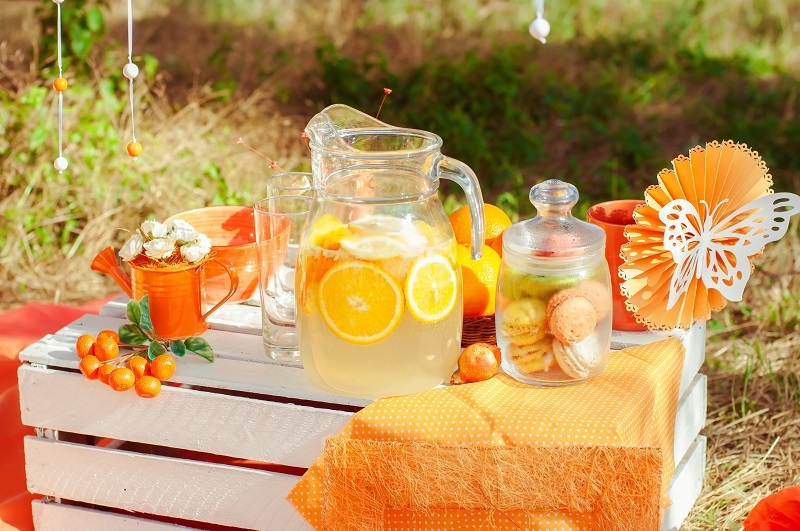Explore how flowers can brighten your mood and well-being
Posted on 29/08/2025
Explore How Flowers Can Brighten Your Mood and Well-being
Flowers have captivated humanity for centuries with their stunning beauty, vibrant colors, and delightful fragrances. But did you know that flowers can boost your mood and well-being in surprising and scientifically-backed ways? Whether arranged in a vase, gifted to a friend, or blooming in a garden, flowers have powerful impacts on our mental, emotional, and even physical health. In this comprehensive article, we'll explore how flowers can transform your daily life, uplift your spirit, and enhance your well-being.
Why Flowers Influence Mood and Well-being
Before we delve into specific benefits, let's understand why flowers can boost your mood and well-being. Flowers tap into our senses, nostalgia, and natural psychology. Here's how they work their magic:
- Visual Appeal: Colorful petals and unique shapes stimulate the brain's pleasure centers.
- Scent: Floral fragrances trigger positive memories and relaxation responses.
- Connection to Nature: Flowers reconnect us with the natural world, fostering a sense of tranquility.
- Symbolism: Different flowers carry cultural and emotional meanings, enhancing their influence.
- Giving and Receiving: The act of gifting or receiving flowers nurtures social bonds, further lifting our mood.
Let's break down the ways flowers brighten mood and benefit overall well-being, backed by research and expert insights.

The Science Behind Flowers and Positive Emotions
Research on Flowers and Happiness
Multiple studies highlight how interacting with flowers positively affects mood. For example, Rutgers University conducted a 10-month study that discovered flowers "immediately impact happiness" and "have a long-term positive effect on moods". Participants reported increased feelings of compassion, decreased anxiety, and greater life satisfaction after receiving or even viewing flowers.
Flowers and Stress Reduction
Simply having flowers in your environment can lower stress levels. According to research published in the Journal of Physiological Anthropology, participants who arranged fresh flowers experienced significantly less stress than those who performed other tasks. This suggests that flowers are natural stress relievers, offering a holistic way to unwind.
Top Ways Flowers Brighten Your Day
1. Visual Stimulation with Color
The colors of flowers aren't just beautiful--they also have psychological effects. Exposure to bright colors, such as the yellows of sunflowers or the pinks of peonies, triggers feelings of optimism, cheerfulness, and energy. Studies in color psychology indicate that even viewing floral images can enhance mood and creativity.
- Yellow: Associated with joy, energy, and creative inspiration.
- Blue: Evokes calmness, relaxation, and trust.
- Red: Stimulates energy, passion, and excitement.
- Purple: Symbolizes luxury, wisdom, and tranquility.
Arranging colorful blooms around your home or workspace can serve as daily visual reminders to embrace positivity and hope.
2. Fragrance's Influence on Emotions
Flowers enhance emotional well-being through scent as well. The sense of smell is closely tied to memory centers in the brain. The aroma of fresh roses, lavender, or jasmine can transport us to joyful times and calm our nerves. Aromatherapy experts often use floral scents to alleviate anxiety, promote restful sleep, and reduce depression symptoms.
- Lavender: Becomes famous for its calming, sleep-inducing properties.
- Rose: Linked to feelings of love and relaxation.
- Jasmine: Known to elevate mood and boost alertness.
- Lily: Enhances a soothing and comforting environment.
Placing a vase of scented blooms in your bedroom or living area can serve as a natural mood booster.
3. Connecting with Nature Indoors
Bringing flowers indoors bridges the gap between the outside world and your home. Studies suggest that regular contact with natural elements, like fresh flowers, decreases feelings of isolation and improves mental clarity. Whether you have a single blossom on your desk or an elaborate arrangement in your kitchen, flowers can brighten your mood and enhance your living space.
4. Encouraging Social Connection
The act of gifting or receiving flowers strengthens social bonds and enhances happiness--both for the giver and the receiver. Flowers are universal symbols of care, gratitude, and celebration. Sharing floral gifts creates moments of joy and fosters a deeper sense of belonging. These positive interactions ripple outward, supporting emotional well-being within families, friendships, and communities.
The Health Benefits of Flowers for Mind and Body
1. Reducing Anxiety and Depression
Engaging with flowers--by arranging bouquets, gardening, or simply admiring them--can be therapeutic. Horticultural therapy uses plants and blossoms to improve mood, decrease depressive symptoms, and enhance cognitive function. Elderly adults, in particular, show marked improvements in memory and social interaction after regular exposure to flowers.
2. Enhancing Creativity and Focus
Flowers stimulate the senses, which in turn fuels creative thinking and problem-solving. Having fresh blooms nearby has been linked to:
- Increased creative output
- Improved concentration
- Greater productivity in work or study environments
Bright, fragrant arrangements provide a gentle yet invigorating backdrop for any creative project or mental task.
3. Supporting Sleep and Relaxation
Certain blossoms, such as lavender and chamomile, are widely used to promote relaxation and sleep. A fresh bouquet in the bedroom, or even dried flowers in a sachet under your pillow, can help ease insomnia and foster restful sleep. The calming presence of flowers initiates relaxation responses within the body, such as lower heart rate and reduced muscle tension.
How to Incorporate Flowers into Your Everyday Routine
1. Flower Arrangements at Home
Place flowers in high-traffic areas of your home--like kitchens, living rooms, or hallways--to maximize their psychological impact. Try rotating different varieties and colors based on seasons or your current mood. Remember, even a single stem in a small vase can make a noticeable difference.
2. Desk or Workspace Blooms
Bring a touch of nature into your workday by adding a small arrangement to your desk. Floral studies indicate that employees with flowers in their workspace are more energetic, less anxious, and report higher job satisfaction. Choose low-maintenance flowers like daisies, tulips, or mini-roses.
3. Gifting and Sharing Flowers
Make it a habit to give flowers to friends, family, or even yourself. The thoughtful gesture of gifting blooms can elevate the mood of the recipient and strengthen your emotional connection. Select flowers that carry personalized meanings--such as roses for love, sunflowers for friendship, or orchids for elegance.
4. Create a Flower Garden
If you have outdoor space, consider planting a small flower garden. Gardening is scientifically proven to decrease stress and promote overall well-being. Plus, tending to living plants brings a sense of accomplishment and nurtures mindfulness. Engage your senses by selecting a mix of colorful, aromatic blossoms.
5. Floral Crafts and Creativity
Try your hand at floral crafts, such as pressing flowers, making potpourri, or designing wreaths. These creative activities not only spark joy, but also prolong the benefits of fresh flowers long after they've bloomed.
Choosing the Right Flowers for Mood Enhancement
Best Flowers to Boost Mood and Well-being
Certain flowers are particularly renowned for their uplifting qualities. Here are a few that are favored for their positive influence:
- Sunflowers: Symbolize happiness, warmth, and vitality.
- Daisies: Represent innocence and cheerfulness.
- Peonies: Associated with prosperity, romance, and positivity.
- Lilies: Known for tranquility and restoration.
- Tulips: Emblematic of renewal and hope.
- Roses: Evoke love, appreciation, and connection.
Flowers and Well-Being in Daily Life: Real Stories
Testimonial: How Flowers Changed My Outlook
"During a challenging time in my life, I started buying a small bouquet of fresh flowers every week. Their presence reminded me to look for beauty, even in tough moments. Over time, having flowers near me became a form of self-care--and helped turn my mood around."
Case Study: Flowers in Healthcare Spaces
Hospitals and clinics increasingly use flowers to boost the moods of patients and staff. Research at hospitals found that patients surrounded by floral arrangements experienced less pain, demonstrated more positive attitudes, and required fewer pain medications. The simple addition of blossoms fostered faster healing and greater patient satisfaction.
Flower Power: Tips for Maximizing Benefits
- Keep Your Blooms Fresh: Change the water, trim stems, and remove wilted petals.
- Mix Varieties: Combine colors, shapes, and scents for richer sensory experiences.
- Engage Mindfully: Take a few moments each day to truly notice and appreciate your flowers. Savor their fragrance, colors, and delicate textures.
- Share the Joy: Bring flowers to community spaces, workplaces, or local charities to multiply the feel-good effects for others.
- Grow Your Own: Planting flowers, even in small pots, gives you continual access to their beauty and positivity.

Conclusion: Embrace the Uplifting Power of Flowers
Flowers are more than just a decorative touch--they are powerful tools for enhancing happiness, comfort, and well-being. Science supports what gardeners, florists, and flower-lovers have known all along: fresh flowers can brighten your mood, relieve stress, and reconnect you to nature and community. By intentionally incorporating flowers into your home, workspace, and daily routine, you invite natural joy, inspiration, and wellness into your life.
So why not pick up a bouquet on your next trip to the market, or plant a few blossoms in your garden? Experience firsthand how flowers can boost your mood and well-being every single day.
Frequently Asked Questions: Flowers and Well-being
How long do the mood-boosting effects of flowers last?
According to research, the positive impact can last several days to a week, especially when flowers are displayed in visible areas and cared for properly.
Can artificial flowers provide the same benefits?
Artificial flowers offer visual appeal, but lack the natural fragrance and life force that fresh flowers provide. For the greatest well-being boost, choose living blooms whenever possible.
What are the best flowers for stress relief?
Lavender, chamomile, lilies, and peonies are among the top choices for alleviating stress and promoting relaxation.
How can I keep cut flowers fresh longer?
- Use clean vases and fresh, cool water
- Trim stems at an angle every few days
- Remove any leaves below the waterline
- Change the water and cut stems regularly
In summary, flowers can truly transform your mood and well-being. Embrace their natural elegance, gift them freely, and let their beauty infuse your life with greater happiness, relaxation, and connection.
Latest Posts
Office-Friendly Plants That Thrive with Little Attention
Explore how flowers can brighten your mood and well-being
Sunflower Confessions: 8 Astonishing Facts You Need to Know






